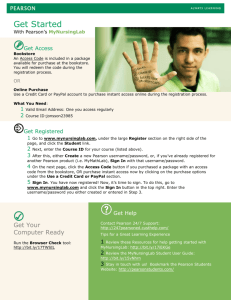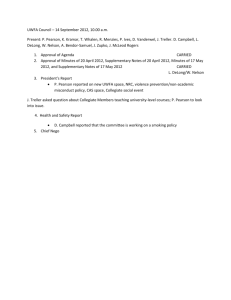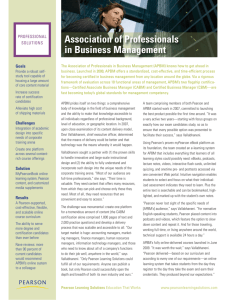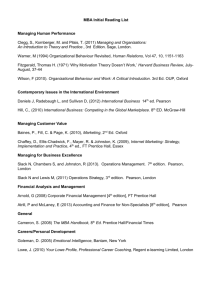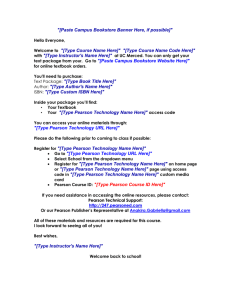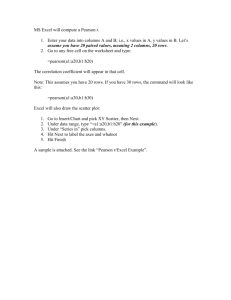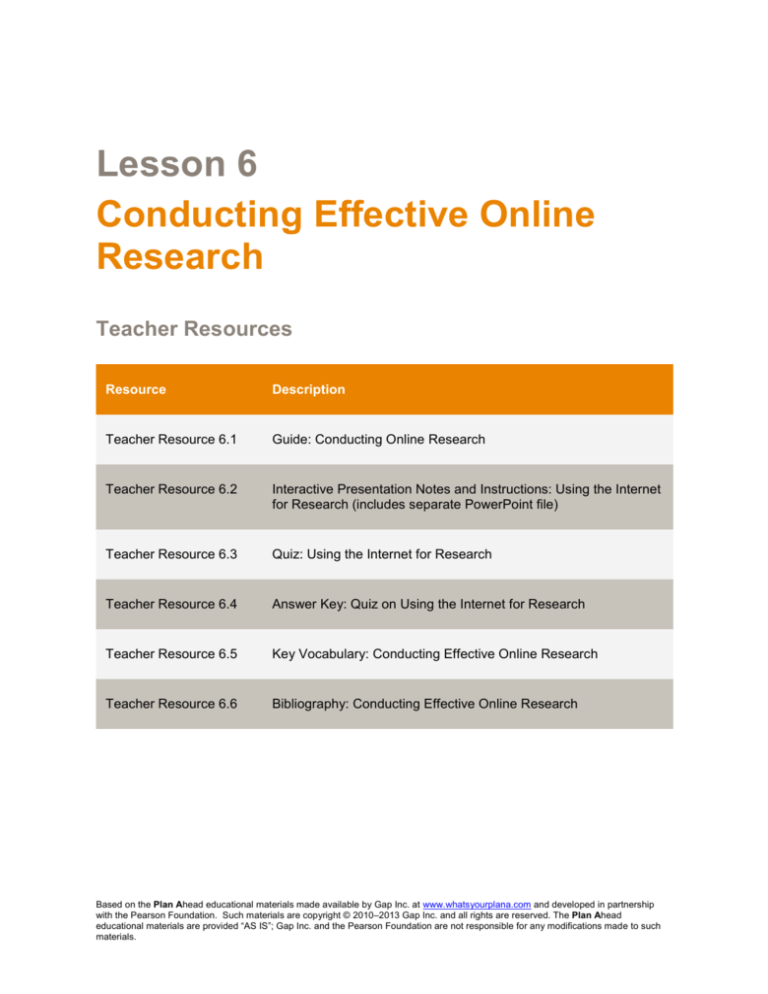
Lesson 6
Conducting Effective Online
Research
Teacher Resources
Resource
Description
Teacher Resource 6.1
Guide: Conducting Online Research
Teacher Resource 6.2
Interactive Presentation Notes and Instructions: Using the Internet
for Research (includes separate PowerPoint file)
Teacher Resource 6.3
Quiz: Using the Internet for Research
Teacher Resource 6.4
Answer Key: Quiz on Using the Internet for Research
Teacher Resource 6.5
Key Vocabulary: Conducting Effective Online Research
Teacher Resource 6.6
Bibliography: Conducting Effective Online Research
Based on the Plan Ahead educational materials made available by Gap Inc. at www.whatsyourplana.com and developed in partnership
with the Pearson Foundation. Such materials are copyright © 2010–2013 Gap Inc. and all rights are reserved. The Plan Ahead
educational materials are provided “AS IS”; Gap Inc. and the Pearson Foundation are not responsible for any modifications made to such
materials.
Plan Ahead Lesson 6
Conducting Effective Online Research
Teacher Resource 6.1
Guide: Conducting Online Research
Read each statement below and ask students to vote by a show of hands on whether the
statements are true or false.
– True or False? Most sources on the Internet are reliable.
– True or False? If I find a website through a Google search, it’s probably okay to use for a
research paper.
– True or False? If a website has expired and sends you to another page, the new site is always
fake.
– True or False? If a website has no author, then you should never use it as a source.
– True or False? Any website that says it’s from a university is safe to use.
– True or False? Blogs are always reliable sources of information since they are written by
experts.
– True or False? You should only cite the websites you use in your research if you quote them.
Do not share the answers with students until after they have viewed the presentation.
Answer Key
True or False? Most sources on the Internet are reliable. False. There are many reliable sources
on the Internet, but there are an equal number of unreliable sources. You need to make sure a
source is reliable before you use it.
True or False? If I find a website through a Google search, it’s probably okay to use for a
research paper. False. A Google search does not guarantee a site’s reliability. You need to follow
the appropriate steps to make sure that a site is accurate and trustworthy.
True or False? If a website has expired and sends you to another page, the new site is always
fake. False. Companies sometimes move their websites for legitimate reasons—because they
buy a new web address, for example. But some website redirections are tricks to get you to
dangerous or unreliable sites, so it’s important to double check.
True or False? If a website has no author, then you should never use it as a source. False. Some
online encyclopedias do not list authors, but they are still reliable. You need to follow the
appropriate steps to make sure a site is trustworthy, whether it lists an author or not.
True or False? Any website that says it’s from a university is safe to use. False. People can put
up a site that claims to be from a university, and some professors put up web pages through their
university that promote their personal ideas or opinions.
Based on the Plan Ahead educational materials made available by Gap Inc. at www.whatsyourplana.com and developed in partnership
with the Pearson Foundation. Such materials are copyright © 2010–2013 Gap Inc. and all rights are reserved. The Plan Ahead
educational materials are provided “AS IS”; Gap Inc. and the Pearson Foundation are not responsible for any modifications made to such
materials.
Plan Ahead Lesson 6
Conducting Effective Online Research
True or False? Blogs are always reliable sources of information since they are written by experts.
False. Blogs are rarely reliable sources because they are designed to express personal opinions.
You might use a blog as a source if you are citing people’s opinions, but you shouldn’t trust facts
that are presented in a blog unless you can verify them by using other sources.
True or False? You should only cite the websites you use in your research if you quote them.
False. You need to cite all the websites you use as research, whether you quote them or not. You
are still using information from that source, even if you’re not quoting it.
Based on the Plan Ahead educational materials made available by Gap Inc. at www.whatsyourplana.com and developed in partnership
with the Pearson Foundation. Such materials are copyright © 2010–2013 Gap Inc. and all rights are reserved. The Plan Ahead
educational materials are provided “AS IS”; Gap Inc. and the Pearson Foundation are not responsible for any modifications made to such
materials.
Plan Ahead Lesson 6
Conducting Effective Online Research
Teacher Resource 6.2
Interactive Presentation Notes and Instructions:
Using the Internet for Research
1. Before you show this presentation, use the text accompanying each slide to develop
presentation notes. Writing the notes yourself enables you to approach the subject matter in a
way that is comfortable to you and engaging for your students. Note the ideas for fully engaging
the students that are placed at key points in the “Notes” section.
2. Make sure to have a book, a newspaper, and a magazine on hand.
3. Determine your preferred citation method or consult with the English/Language Arts
department about its preferred method. Once you decide on a form of citation, make
arrangements to show an example to the students, either by using one of the online tools
(EasyBib or Son of Citation Machine), or by copying the appropriate format onto the board or a
sheet of chart paper.
Based on the Plan Ahead educational materials made available by Gap Inc. at www.whatsyourplana.com and developed in partnership
with the Pearson Foundation. Such materials are copyright © 2010–2013 Gap Inc. and all rights are reserved. The Plan Ahead
educational materials are provided “AS IS”; Gap Inc. and the Pearson Foundation are not responsible for any modifications made to such
materials.
Plan Ahead Lesson 6
Conducting Effective Online Research
Presentation notes
Before you show the presentation, let students
know that there will be a quiz on the
information presented in the next period so
they should pay close attention. Point out that
students may have done online research
before, but they may not have known the best
way to do it. They will learn how to do research
effectively in this presentation, and that is what
they will be tested on—not on their prior
experience.
The Internet is a great tool for doing research.
But just like any research tool, you need to
know how to use it.
Today we’re going to look at:
- How to do an effective Internet search
- How to know if the information you find is
trustworthy
- How to keep track of your sources
Based on the Plan Ahead educational materials made available by Gap Inc. at www.whatsyourplana.com and developed in partnership
with the Pearson Foundation. Such materials are copyright © 2010–2013 Gap Inc. and all rights are reserved. The Plan Ahead
educational materials are provided “AS IS”; Gap Inc. and the Pearson Foundation are not responsible for any modifications made to such
materials.
Plan Ahead Lesson 6
Conducting Effective Online Research
Presentation notes
After showing this slide, ask students: if you
were interested in searching for a summer job,
what search terms would you use?
First, decide on your search terms. If you are
going to write a report on cats, you will use that
word as your main search term. But if you want
to write a report on a specific type of cat, you
would use that term—for example, hairless
cats.
Guide students to recognize that some terms,
such as job, summer job, or jobs for high
school students, might be too broad and bring
up results they aren’t looking for, like full-time
jobs for adults. Instead, students could search
for their city or neighborhood name + jobs for
high school students or for a specific company
or store where they might want to work. (Of
course there are also sites like Craigslist.)
Next, choose a search engine. A search engine
is a tool that helps you to find information on
the Internet. You can use a regular search
engine like Google or Yahoo!.
Based on the Plan Ahead educational materials made available by Gap Inc. at www.whatsyourplana.com and developed in partnership
with the Pearson Foundation. Such materials are copyright © 2010–2013 Gap Inc. and all rights are reserved. The Plan Ahead
educational materials are provided “AS IS”; Gap Inc. and the Pearson Foundation are not responsible for any modifications made to such
materials.
Plan Ahead Lesson 6
Conducting Effective Online Research
Presentation notes
After students have filled in their worksheets,
ask volunteers to paraphrase the process.
Then review the importance of being careful
about submitting personal information to
websites; many students are used to sharing
personal data online and will need more
explanation.
Your search may turn up hundreds or even
thousands of results. You have to decide which
ones to look at.
You shouldn’t just start with the first result that
shows up. There are many sites on the Internet
that contain false information. Sometimes the
only reason sites show up at the top of the list
is that they’ve paid to appear there.
Even worse, there are sites that people use to
steal your identity. That means they get
information about you so they can pretend to
be you. They could get credit cards in your
name or even commit crimes, and then people
would think you had spent that money or
committed those crimes! Be very careful with
websites that ask for your name, your email
address, or your phone number. You don’t
know who can see that information once you
plug it in!
There are four steps to make sure that you’re
using a reliable source. We will go through
each one in detail, so you can feel confident
that you’re choosing good sites.
Based on the Plan Ahead educational materials made available by Gap Inc. at www.whatsyourplana.com and developed in partnership
with the Pearson Foundation. Such materials are copyright © 2010–2013 Gap Inc. and all rights are reserved. The Plan Ahead
educational materials are provided “AS IS”; Gap Inc. and the Pearson Foundation are not responsible for any modifications made to such
materials.
Plan Ahead Lesson 6
Conducting Effective Online Research
Presentation notes
After students complete this section of their
worksheets, ensure understanding by soliciting
responses from a range of students on the
following questions:
What would our school district’s web address
probably end with? (.edu, because it’s an
educational institution)
What do you think Facebook’s web address
ends with? (.com, because it’s a company)
When you use a search engine, the results will
include a web address. When you go to a
specific site, the address will show up at the
top, in the browser.
Web addresses can be long and confusing.
They can include lots of numbers, letters, or
symbols that mean something to your
computer, but don’t mean much to you. That’s
okay. The web address can still give you
important information.
What do you think news channel or newspaper
websites like CNN or the New York Times end
with? (.com, because they are companies)
What do you think the website for the NFL,
NBA, or MLB ends with? (.com, because they
are businesses)
Can anyone remember what the My Next Move
website ends with? (.org, because it’s an
organization founded by the US government to
help people do research about jobs)
The web domain can help you recognize where
the information comes from. The domain
shows up as the last few letters after the
period. Here are some of the common ones
you see and what they mean:
- .com = company (many newspapers and
news magazines are also .com)
- .org = organization (many museums are .org)
- .edu = educational institution (usually a
college or a university)
If the address says it comes from a national
newspaper, news magazine, museum, a
college, or a university, that’s a good first sign.
Based on the Plan Ahead educational materials made available by Gap Inc. at www.whatsyourplana.com and developed in partnership
with the Pearson Foundation. Such materials are copyright © 2010–2013 Gap Inc. and all rights are reserved. The Plan Ahead
educational materials are provided “AS IS”; Gap Inc. and the Pearson Foundation are not responsible for any modifications made to such
materials.
Plan Ahead Lesson 6
Conducting Effective Online Research
Presentation notes
Ask students: could you go home after school
today and start a website? The answer is yes,
if they bought a domain name and knew how to
set up a web page. They could set up a web
page that said they were an expert on a
specific topic or claimed to represent a
museum or other reputable organization.
Nobody has to verify this.
What happens if the site “redirects” you?
Sometimes organizations need to move their
websites to a new address. If you go to the old
link, you may see a message explaining that
you will be redirected to a new site.
Some people do this for criminal reasons—to
steal your identity. Other people do it because
they want to convince you about their opinions
and they think if their website looks like it’s part
of a reputable organization, they can convince
you more easily.
Give students time to make notes on their
worksheet.
When the new site loads, check the web
address immediately.
- Does it look similar to the old address? Is it
still a .com, .org, or .edu?
- Does the content look appropriate? If you
were expecting the home page for a museum,
is that what you see at the new address? If you
expected to see something from a museum
and now you see someone’s personal page, or
some other page that has nothing to do with
museums, don’t use that link! It is no longer
reliable.
- You can also check the “About Us” or “About
the Company” section to learn more about the
site and its sponsor.
Sometimes people make their websites look as
though they’re for museums, schools, or other
good sources, but they aren’t. Anybody can
start up a website claiming to represent a
museum, and there are plenty of college
professors who run websites that promote their
own personal opinions. So you need to look at
more than just the web address.
Based on the Plan Ahead educational materials made available by Gap Inc. at www.whatsyourplana.com and developed in partnership
with the Pearson Foundation. Such materials are copyright © 2010–2013 Gap Inc. and all rights are reserved. The Plan Ahead
educational materials are provided “AS IS”; Gap Inc. and the Pearson Foundation are not responsible for any modifications made to such
materials.
Plan Ahead Lesson 6
Conducting Effective Online Research
Presentation notes
Once students fill in this section of their
worksheets, point out that the Internet is full of
anonymous sources—material that isn’t clearly
labeled with an author’s name. This is different
from the research materials that most people
have used for centuries—books, magazines,
and newspapers.
Who is responsible for writing the content on
the site? Look for an author’s name.
“Webmaster” is not someone’s name; this
person puts the information onto the website
but doesn’t necessarily write it.
You’re trying to find reputable websites.
“Reputable” means that the site has a good
reputation; it contains trustworthy information.
Try to identify who created the site—whether it
represents a person, a company, or some other
kind of organization.
Some websites, like online encyclopedias, may
not list their authors. If you have other reasons
to trust the website (for example, because it’s
one your teacher recommended), you can still
use it, but it’s always better to use a site that
tells you who its authors are.
One thing you should always do is compare the
information you find from different resources.
For example, if you are doing research for your
history class, compare what each website says
with what is in your textbook. A site might have
more detailed information than your textbook,
which is okay. But if the site says World War II
didn’t happen, it’s clearly not a reliable site for
you to use.
Ask for three student volunteers to come to the
front of the room. Give one the book, one the
newspaper, and one the magazine. Ask the
three students to find the author’s name (for
the newspaper and magazine, give them a
specific article to search). Students should be
able to find the author quickly and easily. Ask
students: is it that easy to find the author’s
information on the Internet? (Answer:
sometimes, but not always)
Explain that the Internet is wonderful because it
lets us find information more easily, but it also
means we have to be more careful about
evaluating the information we find, because
anybody can post things online anonymously
or they can lie about their qualifications.
Review the importance of comparing
information to check a source’s accuracy. Ask
students: besides comparing the information to
a textbook, how else could you verify a site’s
accuracy? Guide students to recognize that
this is one reason why it’s important to have
multiple sources. If they find articles on five
different websites, and four of them say
somebody died in 1937 and the fifth one says
the person died in 1947, they can probably
determine which date is the correct one.
Based on the Plan Ahead educational materials made available by Gap Inc. at www.whatsyourplana.com and developed in partnership
with the Pearson Foundation. Such materials are copyright © 2010–2013 Gap Inc. and all rights are reserved. The Plan Ahead
educational materials are provided “AS IS”; Gap Inc. and the Pearson Foundation are not responsible for any modifications made to such
materials.
Plan Ahead Lesson 6
Conducting Effective Online Research
Presentation notes
Share your own personal viewpoint on using
Wikipedia for research in this course.
A wiki allows many different people to add
content or edit it, so either of the people
pictured above could edit the content of a
Wikipedia entry. There are advantages and
disadvantages to wikis. The advantage is that
many different people can contribute. It’s
interactive and it benefits from the wisdom and
expertise of a wide range of contributors.
However, that can also be a disadvantage.
Look at the photographs above. One of these
people is younger than you are. She might not
know enough about a topic to provide good
information. The woman is much older than
you are, and she probably does have
knowledge and expertise on some topics. But
you certainly wouldn’t expect her to know a lot
about the latest techno band or the most
popular TV show with high schoolers. So when
you use a site like Wikipedia, you always need
to remember that you might be reading
something that a non-expert wrote. It could be
incorrect. That’s why some teachers prefer that
you not use Wikipedia as a source for
assignments.
If you are allowed to use Wikipedia, make sure
to double check the information against other
sources. Some articles on the site are more
accurate than others.
Based on the Plan Ahead educational materials made available by Gap Inc. at www.whatsyourplana.com and developed in partnership
with the Pearson Foundation. Such materials are copyright © 2010–2013 Gap Inc. and all rights are reserved. The Plan Ahead
educational materials are provided “AS IS”; Gap Inc. and the Pearson Foundation are not responsible for any modifications made to such
materials.
Plan Ahead Lesson 6
Conducting Effective Online Research
Presentation notes
The site’s creators have a goal, a reason they
built the site. See if you can identify what the
goal is. Usually, a site is built to share
information with the general public.
Discuss the question on the slide. Point out
that sometimes a site will have a mixture of
reliable and unreliable information. For
example, a doctor might have a website with
information about healthy eating. That
information is probably reliable, because the
doctor is an expert. But the website might also
feature information about a special diet plan
the doctor helped create, which you can sign
up for today for only $49.95. That’s a sales
pitch, and the information on that part of the
site is probably not as reliable. So identifying
the goal of a site can help you determine if it’s
reliable, but you have to think carefully about
the information you see, too.
A person might make a site to share her
personal interests.
A company usually makes a site to promote its
business or products.
An organization, like a nonprofit group, might
have a site to talk about the issue or cause the
organization addresses.
If people or companies are selling something or
just sharing their own opinions, their
information may not be trustworthy. A school or
a museum might be more reliable. But also
keep in mind that there are some schools and
museums that have very specific beliefs that
most people don’t follow. So it’s important to
continue to double check your information
against sources you know are reliable, like your
textbook.
Based on the Plan Ahead educational materials made available by Gap Inc. at www.whatsyourplana.com and developed in partnership
with the Pearson Foundation. Such materials are copyright © 2010–2013 Gap Inc. and all rights are reserved. The Plan Ahead
educational materials are provided “AS IS”; Gap Inc. and the Pearson Foundation are not responsible for any modifications made to such
materials.
Plan Ahead Lesson 6
Conducting Effective Online Research
Presentation notes
Discuss the question posted on the slide (about
whether or not it is important for an author to
have a degree or experience with the topic).
Guide students to recognize that checking for a
degree or experience is one of the best ways to
check the validity of the information. Also point
out that journalists who write for well-respected
magazines and newspapers may not be
experts, but they usually have talked to experts
before they write an article. Therefore, their
work is probably a good source as well.
How do you know the author is a trustworthy
source on this topic?
Give students time to add to their worksheets.
- A good source will include the author’s
credentials. Is this person an expert on this
subject—a college professor in this subject or
someone with an important job in this field?
- If the author is a journalist, who is she writing
for? If she writes for a reputable magazine or
newspaper, then she had to prove that her
facts were accurate.
- You can also do a separate search on the
author to learn more about him or her.
- Is there a way to contact the author?
Journalists and experts frequently include this
information, so if people have questions about
the article, they know whom to ask.
Based on the Plan Ahead educational materials made available by Gap Inc. at www.whatsyourplana.com and developed in partnership
with the Pearson Foundation. Such materials are copyright © 2010–2013 Gap Inc. and all rights are reserved. The Plan Ahead
educational materials are provided “AS IS”; Gap Inc. and the Pearson Foundation are not responsible for any modifications made to such
materials.
Plan Ahead Lesson 6
Conducting Effective Online Research
Presentation notes
Discuss the question posted on the slide. Point
out that the earlier date (in 2008) was actually
the day when the election took place. So
something written that day might not include
the results of the election. The later information
(from 2010) would include the results of the
election, so it would be a better source to use.
After students add to their worksheets, ask:
does anyone have a research paper they’re
working on right now? If so, use that topic to
discuss specifics about the date.
Look for the date when the information was
published or updated. It may be at the very top
of the page, or down at the bottom by a
copyright statement.
Sometimes you will see “Published on” and
“Updated on”—that means the information was
published on one date and then added to or
revised on another date. This often happens
with news stories.
If not, use an example topic. What if you’re
writing a paper on the latest cancer research?
On the countries involved in World War II?
Guide students to recognize that some topics
need extremely up-to-date information, while
other topics (like historical or literary topics)
don’t change as quickly, so it’s possible to use
slightly older sources and feel confident they
are still accurate.
What is an acceptable date? In general, look
for the newest information available.
If you are researching something that hasn’t
changed very much, like a historical event, you
can use older information and still feel
confident that it’s reliable. For example, what
we know about the Roman Empire hasn’t
changed much in the last year or two.
But say you’re researching US politics using a
website from 2007. That site would say that our
country has never had an African American
president. If no one has updated this website to
include President Obama, then it’s probably not
a reliable website.
Based on the Plan Ahead educational materials made available by Gap Inc. at www.whatsyourplana.com and developed in partnership
with the Pearson Foundation. Such materials are copyright © 2010–2013 Gap Inc. and all rights are reserved. The Plan Ahead
educational materials are provided “AS IS”; Gap Inc. and the Pearson Foundation are not responsible for any modifications made to such
materials.
Plan Ahead Lesson 6
Conducting Effective Online Research
Presentation notes
Many sites link to other websites that offer
similar information. Try out the links—do they
still connect you to the right information? If they
don’t work, that is a warning sign. If the people
who run the site don’t keep their links up to
date, they probably aren’t making sure the rest
of their information is up to date either.
Based on the Plan Ahead educational materials made available by Gap Inc. at www.whatsyourplana.com and developed in partnership
with the Pearson Foundation. Such materials are copyright © 2010–2013 Gap Inc. and all rights are reserved. The Plan Ahead
educational materials are provided “AS IS”; Gap Inc. and the Pearson Foundation are not responsible for any modifications made to such
materials.
Plan Ahead Lesson 6
Conducting Effective Online Research
Presentation notes
Ask students if they can think of other ways to
recognize an opinion piece. Review the
following:
Some news sites or newspapers actually have
a section called “Opinions” or “Viewpoints.”
They may also put a disclaimer on the page,
such as: “These views represent one person’s
opinion and do not reflect the opinions of
everyone at this organization.”
Is the information fact or opinion? If the article
includes links to other reputable sites or quotes
reputable sources, that’s a good sign. Even if
the article you’re reading is an opinion, you can
look up the facts being provided and use them
for your research.
One sign that the website contains opinions
and not facts is if it says things like, “Everyone
knows….”
If the article says, “I think…” or “I believe…,”
that’s a hint that you’re reading an opinion
piece. Also, if the piece is labeled as an
“editorial,” that’s another word for an opinion
piece. Many blog entries are also opinion
pieces, so be careful if you find something on a
blog. If you can’t find supporting evidence,
don’t use a blog as part of your research.
If the site makes extreme claims that don’t
match up with the rest of your research, it’s
probably someone’s opinion. For example, if
you’re doing research for a history class paper
on the Civil War and you find a site that claims
that Abraham Lincoln was shot by aliens, that’s
someone’s opinion—not a fact.
If you notice that the site is using—or not
using—specific words that other sites
commonly use, that can also be a clue that the
site is biased. For example, some animal rights
groups think calling an animal that lives in your
home a “pet” is an insult. So if you find a site
that talks a lot about “animal companions” and
doesn’t use the word “pet,” that might be a hint
that this site is put together by people with a
very specific viewpoint.
Based on the Plan Ahead educational materials made available by Gap Inc. at www.whatsyourplana.com and developed in partnership
with the Pearson Foundation. Such materials are copyright © 2010–2013 Gap Inc. and all rights are reserved. The Plan Ahead
educational materials are provided “AS IS”; Gap Inc. and the Pearson Foundation are not responsible for any modifications made to such
materials.
Plan Ahead Lesson 6
Conducting Effective Online Research
Presentation notes
Point out that many sites, as well as magazines
and newspapers, include advertisements. So
students should not try to avoid any website
with any kind of ads on it.
Does the website have ads? If the ads aren’t
related to the topic, it just means that this is
how the website is getting paid for. But if the
ads are for the thing you’re researching, then it
makes the whole site suspicious. For example,
if you are researching why Vitamin B is a good
thing, and the ads are for a company that sells
Vitamin B, then you can’t be sure you’re getting
the whole story.
If the website is selling something, that might
influence what the article says. For example, a
veterinarian’s office might have good
information on cats. But if the site claims you
should only feed your cat a specific type of cat
food—which it sells—that’s a warning sign.
Guide students to recognize that the problem
happens when the factual content of a site and
its ads overlap or contradict each other. For
example, a visit to the San Francisco
Chronicle’s website shows that it features ads.
Usually the ads are for local tourist attractions
like Pier 39 or weekend getaways in Monterey
or the Wine Country. If the story you’re looking
at is about the governor of California, then
those ads aren’t a problem for you. But what if
you went to their site and saw a big ad saying
“Jerry Brown is the best governor ever!”? If you
saw that, you might feel like the Chronicle’s
website is not reliable when it comes to articles
about the governor.
Also point out that most news organizations
have specific guidelines about the types of ads
they will take so that they can avoid the
appearance of “conflict of interest.”
Based on the Plan Ahead educational materials made available by Gap Inc. at www.whatsyourplana.com and developed in partnership
with the Pearson Foundation. Such materials are copyright © 2010–2013 Gap Inc. and all rights are reserved. The Plan Ahead
educational materials are provided “AS IS”; Gap Inc. and the Pearson Foundation are not responsible for any modifications made to such
materials.
Plan Ahead Lesson 6
Conducting Effective Online Research
Presentation notes
Demonstrate the citation form that you would
prefer students use in your classroom (either
by accessing EasyBib or Son of Citation
Machine and demonstrating online, or by
copying the appropriate format onto the board
or a sheet of chart paper).
Citing your sources means telling people where
you got your information. When you do
research, you need to list the books,
encyclopedias, and Internet sources you used.
It’s important to cite your sources. It lets your
teacher know that you have used good
information for your report. When experts do
research, they cite their sources so that other
people can do the same research if they want
to. Any time you use someone else’s words or
information, you must cite who and where you
got it from.
It’s also illegal not to! You need to give credit to
the people who wrote the information.
Otherwise it seems as though you wrote it, and
that’s called plagiarism.
For each Internet source you use, write down
the following information:
- The name of the site and the author (Who
made the website? A company? An
organization? An individual?)
- The name of the article, if there was a
specific article you used
- What day you found the information
- The web address or URL
- The date on which the information was
published
Based on the Plan Ahead educational materials made available by Gap Inc. at www.whatsyourplana.com and developed in partnership
with the Pearson Foundation. Such materials are copyright © 2010–2013 Gap Inc. and all rights are reserved. The Plan Ahead
educational materials are provided “AS IS”; Gap Inc. and the Pearson Foundation are not responsible for any modifications made to such
materials.
Plan Ahead Lesson 6
Conducting Effective Online Research
Teacher Resource 6.3
Quiz: Using the Internet for Research
Student Name:__________________________________________________Date:___________
Directions: Respond to the questions below in complete sentences.
1. What are two ways to tell if a source is reliable?
2. What’s the difference between a web address that ends in “.com” and one that ends in
“.edu”?
3. Why is it important to know who is responsible for publishing a website before you use it
as a source?
4. Why does it matter what the goal of a site is?
5. When is it okay to use a blog or an editorial as a source?
6. Why is it important to cite your sources?
Based on the Plan Ahead educational materials made available by Gap Inc. at www.whatsyourplana.com and developed in partnership
with the Pearson Foundation. Such materials are copyright © 2010–2013 Gap Inc. and all rights are reserved. The Plan Ahead
educational materials are provided “AS IS”; Gap Inc. and the Pearson Foundation are not responsible for any modifications made to such
materials.
Plan Ahead Lesson 6
Conducting Effective Online Research
Teacher Resource 6.4
Answer Key: Quiz on Using the Internet for
Research
While student answers will vary, the following answer key contains the basic knowledge and
concepts to be stated in their responses. Use your preferred scoring or point system to assess
the quizzes.
1. What are two ways to tell if a source is reliable? Check the web address; look for the
author or publisher of the site; check the date; find out if the information is fact or opinion.
2. What’s the difference between a web address that ends in “.com” and one that ends in
“.edu”? Addresses ending in “.com” are from companies (including major newspapers and
magazines) and “.edu” sites are educational institutions such as colleges and universities.
3. Why is it important to know who is responsible for publishing a website before you use it
as a source? It’s important to know what person, company, or organization is responsible
for the site so that you can figure out what their reason is for publishing the information. If
they have an opinion or are trying to promote or sell something, you probably shouldn’t
use the website as a source.
4. Why does it matter what the goal of a site is? The site’s goal will influence what
information they present and how they present it. If a site is trying to sell something, for
example, they may present biased or inaccurate information in order to make a sale.
5. When is it okay to use a blog or an editorial as a source? It’s okay to use these sources if
you present the information as opinion and not as fact, and if you can find supporting
evidence from other reliable sources.
6. Why is it important to cite your sources? It’s important to cite your sources so that people
know where you got your information and so that the teacher knows you consulted reliable
sources. It’s also important to give credit to the people who provided the information;
otherwise it looks as though you came up with it yourself. Plagiarism, or acting as though
someone else’s work is your own, is cheating and it is against the law.
Based on the Plan Ahead educational materials made available by Gap Inc. at www.whatsyourplana.com and developed in partnership
with the Pearson Foundation. Such materials are copyright © 2010–2013 Gap Inc. and all rights are reserved. The Plan Ahead
educational materials are provided “AS IS”; Gap Inc. and the Pearson Foundation are not responsible for any modifications made to such
materials.
Plan Ahead Lesson 6
Conducting Effective Online Research
Teacher Resource 6.5
Key Vocabulary: Conducting Effective Online
Research
These are terms to be introduced or reinforced in this lesson.
Term
Definition
advanced search
A tool or a feature on most Internet search engines designed
to help narrow search results.
blog
A contraction of the terms web and log, a type of website
usually maintained by an individual with regular entries of
commentary, descriptions of events, or other data such as
graphics or video.
citation
A reference to a source of information.
citation generator
An interactive online tool designed to create reference
citations for research papers. Son of Citation Machine and
EasyBib are two common citation generators.
editorial
A piece of writing, usually published in a news source,
intended to represent or promote an opinion or a perspective.
meta-search engine
Search engines, such as Cacti Search, that search the results
of multiple search engines and can provide the results all at
once.
plagiarism
Passing off someone else’s ideas, words, or work as your
own; to use someone else’s work without crediting the source.
reputable
Honorable; having a good reputation. A reputable website
contains information that you can trust.
search engine
A tool designed to find information on the Internet. Google,
Yahoo!, Ask.com, Live, and Bing are popular search engines.
Based on the Plan Ahead educational materials made available by Gap Inc. at www.whatsyourplana.com and developed in partnership
with the Pearson Foundation. Such materials are copyright © 2010–2013 Gap Inc. and all rights are reserved. The Plan Ahead
educational materials are provided “AS IS”; Gap Inc. and the Pearson Foundation are not responsible for any modifications made to such
materials.
Plan Ahead Lesson 6
Conducting Effective Online Research
Term
Definition
URL
Uniform resource locator, or web address.
Based on the Plan Ahead educational materials made available by Gap Inc. at www.whatsyourplana.com and developed in partnership
with the Pearson Foundation. Such materials are copyright © 2010–2013 Gap Inc. and all rights are reserved. The Plan Ahead
educational materials are provided “AS IS”; Gap Inc. and the Pearson Foundation are not responsible for any modifications made to such
materials.
Plan Ahead Lesson 6
Conducting Effective Online Research
Teacher Resource 6.6
Bibliography: Conducting Effective Online
Research
The following sources were used in the preparation of this lesson and may be useful for your
reference or as classroom resources. We check and update the URLs annually to ensure that
they continue to be useful.
Print
Lapan, Richard T. Career Development Across the K-16 Years. Alexandria, VA: American
Counseling Association, 2004.
Online
Dennis-Shaw, Sarah. “Wading Through the Web: Teaching Internet Research Strategies.”
ReadWriteThink, http://www.readwritethink.org/classroom-resources/lesson-plans/wadingthrough-teaching-internet-983.html (accessed July 12, 2013).
Gorman, Andrew. “Middle School Lesson Plan: Validity on the Internet.” University of Colorado at
Boulder School of Education and Department of Computer Science,
http://l3d.cs.colorado.edu/~agorman/educ6804/validity/lesson2.htm (accessed July 12, 2013).
Based on the Plan Ahead educational materials made available by Gap Inc. at www.whatsyourplana.com and developed in partnership
with the Pearson Foundation. Such materials are copyright © 2010–2013 Gap Inc. and all rights are reserved. The Plan Ahead
educational materials are provided “AS IS”; Gap Inc. and the Pearson Foundation are not responsible for any modifications made to such
materials.

